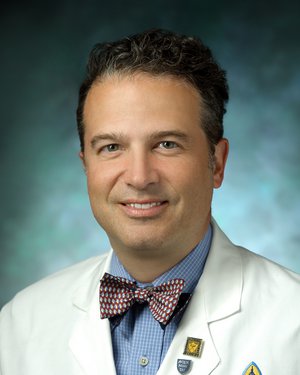Research Lab Results
-
Natalie West Lab
The Natalie West Lab collaborates with Noah Lechtzin’s lab to study cystic fibrosis, with a particular focus on new resistant bacteria and their effect on the lung function of people with cystic fibrosis. -
Liudmila Cebotaru Lab
Research in the Liudmila Cebotaru Lab studies cystic fibrosis transmembrane conductance regulator (CFTR) mutants. We also investigate corrector molecules that are currently in clinical trials to get a better understanding of their mechanism of action. A major focus of our research is on developing more efficient gene therapy vectors with the ultimate goal of developing a gene therapy for cystic fibrosis.
-
William B. Guggino Lab
Work in the William B. Guggino Lab focuses on the structure of the cystic fibrosis transmembrane conductance regulator (CFTR) and water channels; the molecular structure of transport proteins in epithelial cell membranes; and gene therapies to treat cystic fibrosis (CF) patients. We are also working to identify CF’s specific defect in chloride channel regulation. One recent study showed that insulin-like growth factor 1 (IGF-1) enhances the protein expression of CFTR. -
Michelle Eakin Lab
The Michelle Eakin Lab conducts research on behavioral science and adherence and asthma outcomes in inner-city children. Our studies into behavioral science have included exploring the impact of medication adherence on lung health outcomes in patients with cystic fibrosis, disparities in anti-hypertensive medication adherence in adolescents and other key topics. We also investigate methods for improving asthma care and treatment as well as health disparities among various ethnicities, particularly in pediatric patients.
-
Kristin Riekert Lab
Work in the Kristin Riekert Lab focuses on methods for improving health care quality and delivery, particularly among underserved and disadvantaged populations. Our research covers a range of important topics, including health beliefs, treatment adherence, doctor-patient communication, self-management interventions, mobile health initiatives, health disparities and patient-reported outcome methodology. We also work with the National Institutes of Health on multiple intervention trials focused on improving adherence and health outcomes in asthma, chronic kidney disease, cystic fibrosis (CF), sickle cell disease and secondhand smoke reduction.
-
Christian Merlo Lab
Work in the Christian Merlo Lab includes studies on pulmonary arteriovenous malformations, outcomes in lung transplantation and treatment of cystic fibrosis (CF), and HIV-related pulmonary disease. We have studied methods of diagnosing and managing pulmonary arteriovenous malformations as well as the outcomes of adult CF patients who are infected with multiple antibiotic-resistant Pseudomonas aeruginosa. Our recent research has also explored recipient and donor variables in the success or failure of lung transplants, and ways in which national healthcare delivery systems impact lung transplant outcomes for CF patients.
-
Noah Lechtzin Lab
Research in the Noah Lechtzin Lab investigates several important aspects of cystic fibrosis (CF), including the impact of antibiotic-resistant bacterial infections in CF patients and new therapy options for individuals with CF. Our research into new CF therapies has included studies on home electronic symptom and lung function monitoring, transbronchial needle aspiration and bedside percutaneous endoscopic gastrostomy tube placement. We also explore the role of metabolic complications in CF patients by examining how the disease is impacted by factors such as vitamin D deficiency, osteoporosis and testosterone deficiency.
-
Aniket Sidhaye Lab
Dr. Sidhaye is interested in improving the care of persons with cystic fibrosis, type 1 diabetes mellitus and hospitalized person with diabetes. research topics include bone health of persons with CF undergoing lung transplant, CF-related diabetes mellitus, Care of persons with type 1 diabetes mellitus transitioning from pediatrics to adult specialty clinics, Management of hospitalized persons with diabetes.
-
Intestinal Chloride Secretion
Intestinal chloride secretion is stimulated during diarrhea. Cholera toxin is secreted by bacterium Vibrio cholera and is responsible for the watery diarrhea after cholera infection. Mechanistically, cholera toxin increases intracellular cyclic AMP, which subsequently activates protein kinase A and the cystic fibrosis transmembrane regulator chloride channel (CFTR). However, we recently identified an intestinal cAMP-Ca cross-talk signaling pathway that is initiated by elevation of intracellular cAMP and subsequently elevates intracellular Ca concentrations through the exchange protein activated by cAMP (Epac). This observation suggests that both CFTR and calcium-activated chloride channels are targets of elevated intracellular cAMP signaling molecule. Therefore, we are studying the role of calcium-activated Cl channels in intestinal chloride secretion under physiological conditions and during diarrhea. We are also determining whether the recently identified transmembrane protein 16 family of proteins, which are calcium-activated chloride channels, is also involved in intestinal chloride secretion in addition to the well characterized CFTR channel. Increased understanding of regulation of intestinal Cl secretion provides the necessary background information for the development of therapeutic drugs for the treatment of diarrhea, constipation and cystic fibrosis. The discovery that calcium-activated chloride channels are involved in intestinal chloride secretion provides additional targets for anti-diarrhea drug development.


